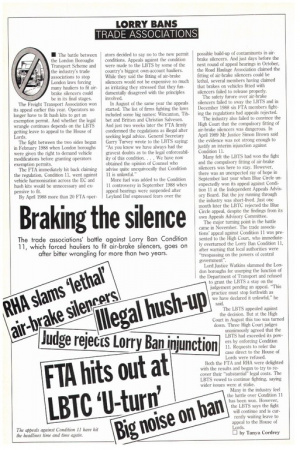LORRY BANS TRADE ASSOCIATIONS
Page 40

If you've noticed an error in this article please click here to report it so we can fix it.
• The battle between the London Boroughs Transport Scheme and the industry's trade associations to stop London laws forcing many hauliers to fit airbrake silencers could be in its final stages.
The Freight Transport Association won its appeal earlier this year. Operators no longer have to fit hush kits to get an exemption permit. And whether the legal wrangle continues depends on the LBTS getting leave to appeal to the House of Lords.
The fight between the two sides began in February 1988 when London boroughs were given the right to demand vehicle modifications before granting operators exemption permits.
The FTA immediately hit back claiming the regulation, Condition 11, went against vehicle harmonisation across the EC and hush kits would be unnecessary and expensive to fit.
By April 1988 more than 20 FTA oper ators decided to say no to the new permit conditions. Appeals against the condition were made to the LBTS by some of the country's biggest own-account hauliers. While they said the fitting of air-brake silencers would not be expensive so much as irritating they stressed that they fundamentally disagreed with the principles involved.
In August of the same year the appeals started. The list of firms fighting the laws included some big names: Wincanton, Tibbet and Britten and Christian Salvesen. And just two weeks later the FrA firmly condemned the regulations as illegal after seeking legal advice. General Secretary Garry Turvey wrote to the LBTS saying: "As you know we have always had the gravest doubts as to the legal enforceability of this condition. . . . We have now obtained the opinion of Counsel who advise quite unequivocally that Condition 11 is unlawful.''
More fuel was added to the Condition 11 controversy in September 1988 when appeal hearings were suspended after Leyland Daf expressed fears over the possible build-up of contaminants in airbrake silencers. And just days before the next round of appeal hearings in October, the Road Haulage Association claimed the fitting of air-brake silencers could be lethal, several members having claimed that brakes on vehicles fitted with silencers failed to release properly.
The safety furore over air-brake silencers failed to sway the LBTS and in December 1988 six FTA members fighting the regulations had appeals rejected.
The industry also failed to convince the High Court that the compulsory fitting of air-brake silencers was dangerous. In April 1989 Mr Justice Simon Brown said the evidence was not strong enough to justify an interim injunction against Condition 11.
Many felt the LBTS had won the fight and the compulsory fitting of air-brake silencers was here to stay. However, there was an unexpected ray of hope in September last year when Blue Circle unexpectedly won its appeal against Condition 11 at the Independent Appeals Advisory Board. But the joy running through the industry was short-lived. Just one month later the LBTC rejected the Blue Circle appeal, despite the findings from its own Appeals Advisory Committee.
The major turning point in the battle came in November. The trade associations' appeal against Condition 11 was presented to the High Court, who immediately overturned the Lorry Ban Condition 11, after warning that local authorities were "trespassing on the powers of central government".
Lord Justice Watkins slammed the London boroughs for usurping the function of the Department of Transport and refused to grant the LBTS a stay on the judgement pending an appeal. "This practice must stop forthwith as we have declared it unlawful," he The LBTS appealed against the decision. But at the High Court in August this too was turned down. Three High Court judges unanimously agreed that the LBTS had exceeded its powers by enforcing Condition 11. Requests to refer the case direct to the House of Lords were refused.
Both the FTA and RHA were delighted with the results and began to try to recover their "substantial" legal costs. The LBTS vowed to continue fighting, saying wider issues were at stake.
Many in the industry feel the battle over Condition 11 has been won. However, the um says the fight will continue and is currently waiting leave to appeal to the House of Lords.
by Tanya Cordrey
























































































